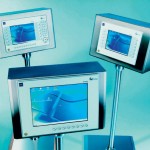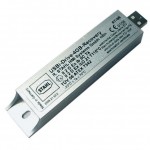One major advantage of the Open HMI series is its easy maintenance and repair. Inside, the devices are constructed in a modular way, consisting of various components with different protection types. Some modules have the Ex m type of protection while others, such as the CPU and the power supply unit, have Ex d and the terminal PCBs have Ex e or Ex i. This design means that an Open HMI housing can be opened on site even in hazardous areas and many modules replaced directly.
In the past, graphical operator control and monitoring systems in this performance class had to either be replaced completely or undergo extensive repairs in case of a malfunction. Maintenance of Open HMI systems, on the other hand, is quick and can be carried out on site, even in hazardous areas. Production downtime and standstills can thus be reduced to a minimum. If a module needs to be replaced as part of a repair, this can often be done by any user who has received brief training. In most plants with a hazardous area, these devices are not only the most efficient but also the most cost-effective HMI solution.
Open HMI devices are PC-based operator control and monitoring systems for industrial applications. They can be either stand-alone devices or panel-mounted. The series has a robust design and is thus suitable for even the harshest environments, where vibrations, very high or very low temperatures and/or electromagnetic interference pose a great challenge to the automation technology. Its name refers to the open platform as a particular system highlight: a lean Windows XP Embedded, Windows XP Professional or Unix/Linux version are supported as the operating system.
This kind of HMI is typically used in the oil and gas industries, where it is ideal for exploration, extraction, processing and shipping. Owing to the often remote locations in extreme climatic zones, exceptional du-rability and temperature resistance are vital. There are also many potential applications for PC-based HMI systems in engineering, for example on centrifuges, mixers, compressors, coaters and varnishing lines. Last but not least, the chemical and pharmaceutical industries are key sectors. In addition to the qualities mentioned above, the operator control and monitoring technology must also tolerate solvents, for example, fulfil clean room requirements and comply with the relevant GMP regulations for local operation and batch processes.
A top priority for most applications in all such industries is that the HMI solution must be easy to service. Even industrial PC technology, on which modern operator control and monitoring systems are based, still has a number of parts susceptible to wear. It is likely that these parts will have to be replaced at some point during the long service life of the devices. Faulty hard drives are a particular case in point. If re-pairs are necessary, it is important that the design of the HMI device does not create additional problems. Unfortunately, however, the opposite is frequently true with explosion-proof HMI systems.
Many of the solutions currently on the market have the Ex m type of protection, in other words the entire physical block is embedded in a casting compound. It is, of course, impossible to repair or replace individual components with this type of construction. Another popular type of protection is sand filling (Ex q), where the housing is filled with sand and then sealed. Systems protected in this way can usually only be repaired by the manufacturer. In addition, the hygroscopic properties of sand mean that the devices cannot be opened anywhere on site but only in a specific environment, in which they can subsequently be safely re-filled with sand that is guaranteed to be dry prior to being re-sealed.
Modules with different types of protection
The reasons outlined above mean a completely different, that is to say modular, design is called for to facilitate maintenance and repair. In principle, this can be achieved by using a flameproof enclosure as explosion protection. Unfortunately, this method results in very bulky systems in practice. The larger the enclosed Ex d space, the greater the potentially explosive volume. Glass and walls of sufficient thickness for a housing with the Ex d type of protection can easily result in a 15 inch HMI weighing upwards of 30 kilos.
With its Open HMI series, R. Stahl HMI Systems has developed a much more elegant alternative that is about half the weight of conventional solutions. Inside, the devices are constructed in a modular way, consisting of various components with different protection types. Some modules have the Ex m type of protection (casting compound) while others, such as the CPU and the power supply unit, have Ex d, and the terminal PCBs have Ex e or Ex i. This design means that an Open HMI housing can be opened on site even in hazardous areas and many modules replaced directly. In addition, the devices are fitted with an Ex e (increased safety) terminal box, enabling typical wearing parts – such as the mass storage – to be maintained and repaired particularly easily. The USB 2.0 flash drives with up to 8 GB mean that in most cases the systems manage without any rotating parts – the number one source of faults in PC-based systems. If more memory is required, Sata hard drives offering up to 60 GB can be used as an alternative.
The heart of the Open HMI systems is a Pentium M processor with a clock rate of up to 1.6 GHz. This Intel chip combines unprecedentedly low energy consumption with excellent performance. Due to the low operating voltage, the processor dispenses with a fan, thus significantly reducing the risk of CPU failure. The Pentium M is maintenance-free and has a very long service life. Open HMI systems can be supplied with a lean Windows XP Embedded version pre-installed (all unnecessary drivers removed) or, if preferred, Windows XP Professional SP 2 or Unix/Linux. On request, they can also be delivered with ready-to-use standard applications such as Siemens Win CC flexible or Rockwell RSView. The boot-up time is just 40 s. The Bios of an Open HMI is specially adapted and protected, and the system partition is likewise protected against viruses, worms and system corruption. The Crash Recovery USB stick represents an extremely practical, integrated method for backing up and restoring custom configured systems. Open HMI systems operate multilingually in 25 languages. The touch keyboard supports 150 different language layouts at the Windows login to facilitate worldwide operation.
Thanks to a whole set of international certificates, Open HMI systems can be installed almost everywhere across the globe. Models with different certificates are available depending on the type of hazardous area. The Exicom models can be installed in explosive dust and gas atmospheres without a specially approved housing. They are marked Atex II 2 (2) G Ex d e mb ib [ib] [op is] IIC T4 or Atex II 2 D Ex tD A21 IP65 T90°C. The ProVicom models are certified according to Atex II 3 (2) G Ex nA nL [ib] IIC T4 or Atex II 3 D IP65 T90°C. In addition to marine certification by DNV, the Exicom models also have Inmetro and Gost-R certificates as well as IEC Ex, KTL and TIIS (pending) and are approved for use in UL Class 1 Zone 1 AEx d e ib [ib] IIC T4.
Hall 7, Booth E13
cpp 427
Operating and monitoring systems by R. Stahl
PCIC Europe Conference (Weimar)
Hannover Fair Interkama
Share:








